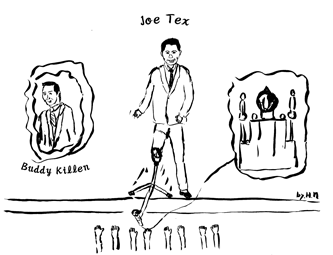

Ministers of church took a large role in the improvements of the black's status including the Civil Rights Movement, and they rode on fair winds of the liberal whites who were also the same Christians. Meanwhile, there had been groups like the Nation of Islam or the Black Panther Party which claimed the independence of themselves and laid stress on superiority of the black and seperation from the white. What they did and said was often taken as radicalism by the America society and they were likely to be told as scandalous cults. However, they still cannot be ignored because of subsequent influences of Malcom X or Muhammad Ali. It is a clear declaration for those who want to show their own identity to "give the name not granted by baptism but by my own choice". Moreover, claims of such groups should touch the chord of the heart of those who have some questions about the materially civilized society where Christianity stands at the top. Cat Stevens or Richard Thompson of Britain and Joe Tex, whom I write about later, are converts to Islam, though I don't know whether they also changed their music style.
As shown with his stage name, Joe Tex was born in Texas and raised by gospel-singing in church, also with a considerable interest in country music. The win of a local talent contest brought him to New York, where he also came into prominece at the Apollo Theater, and then he had some sides from Cincinnati's King in the mid-'50s. Many of his sides at that time were novelties or similarities of R&B hits. Especially, Pneumonia is almost the same as Little Willie John's hit Fever (appeared on "Golden Age of American Rock'N'Roll vol.9" and so on). Joe told that he really wrote Fever, however, I don't know the truth. During his stay at Ace of Jackson, Mississippi, he left tunes like LIttle-Richard-type one (You Little Baby Face Thing) or Coasters-type one (Charlie Brown Got Expelled). In his tunes including King sides from "Get Way Back", Joe Tex handily sings with the easy-going and shuffling backings of Huey 'Piano' Smith & The Clowns, but he ended in a sort of mimicing. Despite it his writing skill were well polished and his Baby , You're Right from Detroit's Anna made breakthrough by the rendition of James Brown (you can have JB's version on "Star Time"). Buddy Killen, the publisher in Nashville, took notice of him and tried to make a contract with any Nashville's label but in vain. After all, Killen founded his own label Dial. His first recordings were in Nashville and Memphis, where the outline of southern soul, the future powerful force, began to appear. These recordings on "First on the Dial" also contain mimicries, however, there are fine ones like driving I Wanna Be Free or blusy Blood's Thicker Than Water. Appeared on Meet Me in Church also read by Solomon Burke or Bobby Marchan, his own compositions got more gospel elements and Joe got to have a series of hits since the breakthrough of Hold What You've Got,.
For Dial was under the distribution of Atlantic from '64 to '70, I listened to Joe Tex tunes for the first time on "Atlantic Rhythm & Blues 1947-1974", as you know. His tenor voice is gospel-influenced, raucous and sticky. While his ballad is so sweet and hot, his preacher-style rap is eloquent and closing in upon the audience. Most of his tunes on "25 All-time Greatest Hits" were recorded in various styles at Fame studios in Muscle Shoals. Hold What You've Got is a ballad inserted with the rap admonishing a husband and a wife individually to take care of each other. I Want to (Do Everything for You), A Sweet Woman Like You and The Love You Save (May be Your Own) are pretty romantic in the way of telling under the influence of country. In the slow and funky work One Monkey Don't Stop No Show, Joe tells like a preacher and sings up responses to female gospel chorus. S.Y.S.L.J.F.M (The Letter Song) is a kind of condensed Wilson Pickett's 634-5789. Hard rocker Show Me feels like a rough celebration of a couple by a non-licensed clergyman. Not only Skinny Legs and All, the pseudo-live production in a night club where he talks with the audience and raps, but a kind of its second brew Men Are Gettin' Scarce is no less funky than JB and knocks me out thanks to the intersection of rhythm and Joe Tex's rap on the way of the tune.
After the release of funky but too funny I Gotcha in the early '70s, Joe Tex suddenly changed his name to Yusef Hazziez and quit his musical activity and became a minister of the Nation of Islam. He had began devote himself to the teachings of the leader Elijah Muhammad since having his own succeeding hits. And then he gained some questions about his life soaked in show business, where he made gigs with his original action like bringing down his mike stand and bringing it back with his foot. However, economical activities are indespensable to living in a society and not only in the case of music it's hard to quit completely what one had lived for. While some get acute, it seems to me that today's religion becomes willingly generous to secular activities. After the death of Ilijah Muhammad, the Nation of Islam stopped their separatistic actions and began to take lines in cooperation with the Administration. In such circumstances, Joe Tex started again his singing career and had a comical disco hit Ain't Gonna Bump No More (with No Big Fat Woman). If he had been still alive as a keen insighter into human nature and humorist, he should have had a role of diminishing the prejudice against the Moslem in the United States, so I imagine. (2005/10/30)